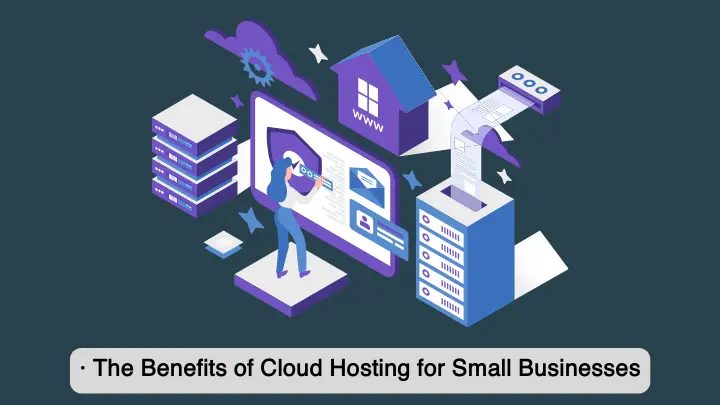The Benefits of Cloud Hosting for Small Businesses
In today’s digital age, having a reliable and scalable hosting solution is critical for small businesses. Cloud hosting has become a popular choice due to its numerous advantages over traditional hosting. It offers flexibility, cost-efficiency, and better performance, all of which are crucial for small businesses aiming to grow without incurring hefty IT infrastructure costs.

In this article, we will explore the benefits of cloud hosting for small businesses and why it’s a game-changer for your enterprise.
1. Cost-Efficiency
One of the most significant benefits of cloud hosting is its cost-efficiency. Small businesses often operate with limited budgets and cannot afford the high upfront costs associated with traditional dedicated servers.
- Pay-As-You-Go Model: Cloud hosting typically operates on a pay-as-you-go basis, which means businesses only pay for the resources they use. This eliminates the need to invest in expensive hardware and software upfront.
- No Maintenance Costs: Since the cloud hosting provider takes care of the server maintenance, businesses can save on IT staff costs and the expenses associated with maintaining physical servers.
- Scalability Without Extra Costs: Unlike traditional hosting, which may require businesses to pay for more resources than they need, cloud hosting allows for seamless scaling without significant additional costs.
This financial flexibility can make a big difference for small businesses, allowing them to allocate funds to other critical areas like marketing or product development.
2. Scalability and Flexibility
Small businesses often face unpredictable growth, and cloud hosting provides the perfect solution with its scalability and flexibility. As your business grows, you can easily scale up or down based on your needs.
- Easy Resource Allocation: Cloud hosting enables businesses to quickly add or reduce server resources like storage, RAM, and CPU, ensuring you only pay for what you need at any given time.
- Flexible Plans: Cloud hosting providers offer flexible plans that cater to different business sizes, ensuring you’re not locked into rigid plans that either limit your growth or make you pay for unused resources.
This scalability helps small businesses to respond to increasing traffic or seasonal demand fluctuations without any downtime or performance issues.
3. Enhanced Security
Security is a major concern for small businesses, especially when it comes to sensitive customer data. Cloud hosting providers invest heavily in advanced security protocols, offering levels of protection that small businesses might not be able to implement on their own.
- Data Encryption: Cloud hosting services usually offer end-to-end encryption, ensuring that data is secure both at rest and in transit.
- Regular Security Updates: Providers continuously update their systems to protect against the latest threats, including malware, DDoS attacks, and unauthorized access.
- Disaster Recovery: Many cloud hosting platforms include automated backups and disaster recovery solutions, ensuring that your business data is safe even in the event of an unexpected failure.
By leveraging these built-in security features, small businesses can ensure the safety of their data and maintain trust with their customers.
4. Better Performance and Uptime
Small businesses can’t afford to have their websites go down or experience performance issues, as these could lead to lost customers and missed opportunities. Cloud hosting ensures optimal performance and uptime, which are critical for keeping a website running smoothly.
- Load Balancing: Cloud hosting automatically distributes traffic across multiple servers, ensuring that your website can handle traffic spikes without crashing.
- Guaranteed Uptime: Most cloud hosting providers offer uptime guarantees of 99.9% or higher, minimizing the risk of downtime.
- Faster Website Loading: Cloud hosting typically results in faster load times as it uses multiple servers to distribute resources and reduce latency. A faster website not only improves user experience but also helps in search engine rankings.
These performance enhancements help small businesses maintain a professional online presence and provide their customers with a seamless browsing experience.
5. Easy Collaboration and Remote Access
With many businesses now adopting remote work or a hybrid work environment, cloud hosting enables seamless collaboration and remote access. Teams can easily access the hosting environment from anywhere with an internet connection.
- Collaboration Tools: Many cloud hosting platforms offer built-in collaboration tools that allow multiple users to work on a project or document simultaneously. This is particularly beneficial for small businesses with remote or geographically dispersed teams.
- Remote Management: Cloud hosting platforms allow businesses to manage their websites and applications remotely. This is useful for IT teams who need to access the system quickly to fix issues or make updates.
This flexibility improves productivity and ensures that your business runs smoothly, regardless of where your employees are located.
6. Automatic Updates and Maintenance
Traditional hosting often requires small businesses to handle manual updates and maintenance, which can be time-consuming and prone to errors. Cloud hosting simplifies this process through automatic updates.
- Automatic Software Updates: Cloud hosting providers take care of updating your system’s software, including security patches and upgrades, ensuring that your website is always running on the latest version.
- No Downtime for Maintenance: Since cloud servers operate on multiple servers, updates and maintenance can be performed without any downtime. This ensures your website stays online and accessible to customers even during upgrades.
Automatic updates free up time for small businesses to focus on other areas like growing their business or improving customer service.
7. Improved Data Backup and Recovery
For small businesses, losing data can be catastrophic. Whether it’s customer data or important business documents, having a solid backup and recovery plan is essential. Cloud hosting providers offer automated backup solutions that store data in secure, remote locations.
- Regular Backups: Cloud hosting platforms typically offer automatic daily or weekly backups, ensuring that your data is always up to date.
- Fast Recovery: In case of a system failure or breach, cloud hosting providers offer quick recovery solutions, minimizing the downtime and impact on your business.
- Version Control: Some providers also offer version control, which means you can revert to a previous version of your website or application if an update causes problems.
With cloud hosting, small businesses can rest assured that their data is safe and can be quickly recovered in case of an emergency.
8. Environmentally Friendly
Cloud hosting is more environmentally friendly compared to traditional hosting. By utilizing multiple servers and optimizing resources, cloud hosting providers can reduce energy consumption and the carbon footprint of their data centers.
- Efficient Resource Use: Instead of running servers at full capacity 24/7, cloud hosting optimizes resource use based on demand, reducing energy waste.
- Green Data Centers: Many cloud hosting providers are committed to using green energy and running eco-friendly data centers.
For small businesses that are conscious of their environmental impact, cloud hosting offers a more sustainable solution while providing the technological advantages needed for growth.
Conclusion
Cloud hosting offers numerous benefits that make it an ideal solution for small businesses. From cost savings and scalability to enhanced security and performance, cloud hosting provides the flexibility and reliability that small businesses need to thrive in an increasingly competitive digital landscape. It not only reduces costs but also ensures that your website is secure, fast, and always accessible.
By embracing cloud hosting, small businesses can focus on growth and innovation while leaving the heavy lifting of server management, security, and performance to the experts.
Common Questions
- Is cloud hosting suitable for all small businesses?
- Yes, cloud hosting is versatile and can cater to a wide range of businesses, from e-commerce stores to professional services.
- Is cloud hosting more expensive than traditional hosting?
- While the costs may seem higher initially, cloud hosting is often more cost-effective in the long run due to its scalability and reduced need for in-house IT management.
- Can cloud hosting handle large amounts of traffic?
- Yes, cloud hosting is highly scalable, meaning it can handle large traffic spikes without slowing down or crashing.
- How secure is cloud hosting?
- Cloud hosting providers offer robust security measures, including encryption, regular updates, and disaster recovery solutions.


